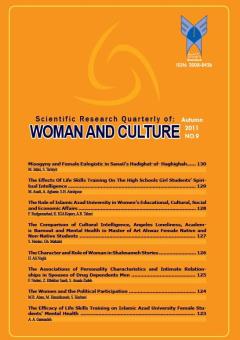The Associations of Personality Characteristics and Intimate Relationships in Spouses of Drug Dependents Men
Subject Areas : Sociology
Farah Naderi
1
,
زهرا Eftekhar
2
![]() ,
صغری Amola Zadeh
3
,
صغری Amola Zadeh
3
1 - Department of Psychology, Ahvaz Branch, Islamic Azad University, Ahvaz, Iran.
2 - Islamic Azad University, Ahwaz Branch, Instructor of Psychology, Department of Psychology, Ahwaz, Iran.
3 - Islamic Azad University, Ahwaz Branch and instructor of Tarbiat Moaalm Farhangian University ,M.A in Psychology, Ahwaz, Iran.
Keywords:
Abstract :
The purpose of this study was to investigate the associations of personality characteristics with intimate relationships in spouses of drug dependents men who conferred to addiction disuse centers in Ahwaz. The sample consisted of 200 spouses of drug dependents men which were selected randomly via simple sampling method. To collect data NEO Personality Five–Factor Inventory and Intimacy Scale were implied. The research was a descriptive study. to analysis the data, simple correlation and regression analysis procedures were applied. The results indicated that the neuroticism had significant negative correlation with intimate relationships while extraversion, openness, agreeableness and conscientiousness had significant positive correlation with intimate relationships. Finally, a multiple regression analysis showed that neuroticism, extraversion, openness, agreeableness, conscientiousness had multiple significant correlations with intimate relationships. The results also revealed that neuroticism, conscientiousness, openness and extraversion were stronger predictors to intimate relationships.
اشترنبرگ، رابرت جی (1986). مقیاس عشق مثلثی اشترنبرگ. ترجمة حمزه گنجی (1384). تهران: مرکز نشر روانسنجی.
اعتمادی، عذرا (1384). بررسی و مقایسه اثربخشی رویکرد روانی – آموزشی مبتنی بر شناختی – رفتاری و ارتباط درمانی و صمیمیت زوجینِ مراجعه کننده به مراکز مشاوره شهر اصفهان. پایان نامه دکتری، دانشگاه تربیت مدرس.
ثنایی ذاکر، باقر (1379). مقیاس های سنجش خانواده و ازدواج. تهران، انتشارات بعثت.
چاپمن، گری (1995). پنج نشانه خانواده سرشار از عشق. ترجمه سیمین موحد (1384). تهران: نشر ویدا.
خجسته مهر، رضا (1384). بررسی ویژگی های شخصیتی ، مهارت های اجتماعی ، سبک های دلبستگی و متغیرهای جمعیت شناختی به عنوان پیش بین های موفقیت و شکست در زوج های متقاضی طلاق و عادی در اهواز. پایان نامه دکترای روانشناسی، دانشکده علوم تربیتی و روانشناسی دانشگاه شهید چمران اهواز.
صادقی، نگار (1380). بررسی و مقایسه تمرینات شناختی و تفکرات ناکارآمد در مردان معتاد به مواد مخدر و افراد بهنجار، پایان نامه کارشناسی ارشد، دانشکده علوم تربیتی و روانشناسی، دانشگاه تربیت معلم.
قبادی، برومند (1381). صمیمیت در زوجین. تهران: نشر فن آوران.
کیامهر، جواد (1381) . هنجاریابی فرم کوتاه پرسشنامۀ پنج عاملی نئو و بررسی ساختار عاطفی آن در بین دانشجویان علوم انسانی دانشگاه های تهران، پایان نامۀ کارشناسی ارشد سنجش و اندازه گیری، دانشگاه علامه طباطبایی تهران، دانشکدۀ علوم تربیتی و روانشناسی.
گلاسر، ویلیام (2000). ازدواج بدون شکست. ترجمه هدی برازنده و سمیه خوش نیکو، (1384). مشهد: انتشارات محقق.
ملازاده، جواد (1381). رابطه سازگاری زناشویی با عوامل شخصیت و سبک های مقابلهای در فرزندان شاهد. پایان نامه دکتری, دانشگاه تربیت مدرس تهران.
منصوری، زهره، مهرابی زاده هنرمند، مهناز(1389) رابطه اختلال در سلامت روانی و خشنودی شغلی با رضایت زناشوئی در نان شاغل، فصلنامه علمی پژوهشی زن و فرهنگ، سال اول، شماره سوم، ص 102-91.
موسوی، اشرف السادات (1386). مشاوره قبل از ازدواج. چاپ اول، تهران: نشر مهر کاویان.
نوابی نژاد، شکوه. (1380) مشاوره و ازدواج و خانواده درمانی، تهران: انتشارات انجمن اولیا و مربیان.
وزیری، سعید (1386). بررسی رابطه سلامت روانی با رضایت زناشویی با کنترل طول مدت ازدواج در مردان معتاد مراجعه کننده به کلینیک ترک اعتیاد امام رضا (ع) شهرستان آغاجاری. پایاننامه کارشناسی ارشد مشاوره و راهنمایی. دانشگاه آزاد اسلامی، واحد علوم و تحقیقات اهواز.
Amated, E. S & Brown, M. N. (2000). Love and intimate relationship. London. Brunner Mazzel press.
Bogarozzi, D. A. (2001). Enhancing intimacy in marriage. Banner Rouledye. Tylor & Forancis.
Carter, E. & Mc Goldrick, M. (1980). The Family life Cycle: A framework for family therapy. New York: Gardner.
Costa, P. T., & McCrae, R. P. (1992). Normal Personality assessment in clinical practice: The NEO personality inventory, psychological assessment. Journal of Consulting and Clinical Psychology, 7, 5-13.
Gottman, J.M. & Krokoff, L. J. (1989). Marital in traction and satisfaction: A Longitudinal view. Journal of consulting and Clinical Psychology, 57, 47-52.
Karney, B. R. & Bradbury, T. N. (1995). The longitudinal course of marital quality stability: a review of theory, method, and research. Psychological Bulletin, 118, 3-34.
Kirby, J. S. Baucom, D. H. & Peterman, M. A. (2005). An investigation of unmet intimacy needs in marital relationships. Journal of Marital and Family therapy, 31, 313-325.
Levinger, G., & Huston, T. L. (1990). The social psychology of marriage. In T. Bradbury & F. Fincham (Eds.). The psychology of marriage (pp. 19-58). New York: Guilford Press.
Malouff, J. M, Thorsteinsson, E. B., Schutte, N. S., Bhullar, N., & Rooke, S. E. (2010). The Five-Factor Model of personality and relationship satisfaction of intimate partners: A meta-analysis. Journal of Research in Personality, 44, (1), 124-127
McCrae, R. R., & Costa, P. T. (1985). Updating Norman, s "adequate taxonomy": Intelligence and personality dimensions in natural language and questionnaires. Journal of personality and Social psychology, 49, 710-721.
McCrae, R. R., & Costa, P. T. (2004). "A contemplated revision of the NEO Five-Factor Inventory". Personality and Individual Differences, 36 (3): 587–596.
Nemechek, S., & Olson, K. R. (1999). Five-factor personality similarity and marital adjustment. Social Behavior and Personality, 27 (3), 309-318.
Sperry, L., & Carlson, Y. (1991). The work centered couple. The family psychologist, 7 (4), 19-21.
Walker, A. J. & Thompson, L. (1983). Intimacy and intergenerational aid and contact among mothers and daughters, Journal of Marriage and the Family, 45, 841-849.
Westman, M., & Bakker, A.B. (2008). Crossover of burnout among health care professionals. In J.R.B. Halbesleben (Ed.), Handbook of stress and burnout in health care. New York, NY: Nova Science.
White, J. K., Hendriak, S. S., & Hendriak, C. (2004). Big five personality variables and relationship constructs. Journal of personality of and individual differences, 37, 1519-1530.
Young, M. E. & Long. L. L. (1998). Counseling and therapy for couples. Brooks/Cole, Publishing Company, USA.
_||_

